Reflective Journal: Culture, Mental Health, Aboriginal Communities
VerifiedAdded on 2023/04/19
|5
|1174
|349
Journal and Reflective Writing
AI Summary
This reflective journal entry examines the significant disparities in mental health experienced by Aboriginal and Torres Strait Islander communities in Australia, highlighting the impact of cultural disruption, historical trauma, and systemic discrimination. The author explores the role of cultural factors, including the loss of land, traditions, and identity, in contributing to mental health issues. The reflection delves into the importance of culturally appropriate services and engagement strategies, such as the National Disability Insurance Scheme and the National Aboriginal and Torres Strait Islander Health Plan, in addressing these challenges. The author emphasizes the need for cultural humility and a holistic understanding of health and well-being, advocating for increased participation and connectivity to ensure equitable access to mental health services. The reflection concludes with a call for greater understanding and celebration of diversity to promote overall well-being.
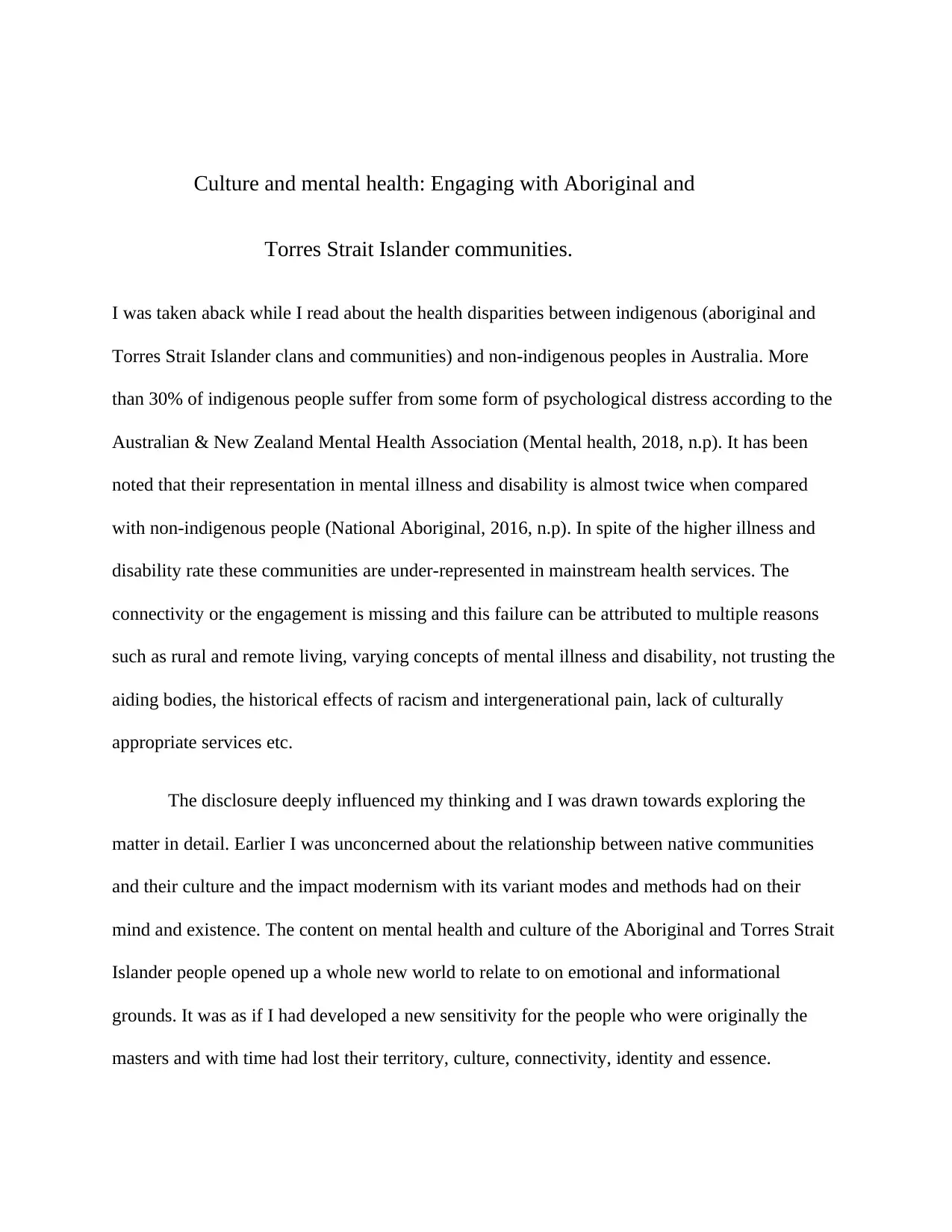
Culture and mental health: Engaging with Aboriginal and
Torres Strait Islander communities.
I was taken aback while I read about the health disparities between indigenous (aboriginal and
Torres Strait Islander clans and communities) and non-indigenous peoples in Australia. More
than 30% of indigenous people suffer from some form of psychological distress according to the
Australian & New Zealand Mental Health Association (Mental health, 2018, n.p). It has been
noted that their representation in mental illness and disability is almost twice when compared
with non-indigenous people (National Aboriginal, 2016, n.p). In spite of the higher illness and
disability rate these communities are under-represented in mainstream health services. The
connectivity or the engagement is missing and this failure can be attributed to multiple reasons
such as rural and remote living, varying concepts of mental illness and disability, not trusting the
aiding bodies, the historical effects of racism and intergenerational pain, lack of culturally
appropriate services etc.
The disclosure deeply influenced my thinking and I was drawn towards exploring the
matter in detail. Earlier I was unconcerned about the relationship between native communities
and their culture and the impact modernism with its variant modes and methods had on their
mind and existence. The content on mental health and culture of the Aboriginal and Torres Strait
Islander people opened up a whole new world to relate to on emotional and informational
grounds. It was as if I had developed a new sensitivity for the people who were originally the
masters and with time had lost their territory, culture, connectivity, identity and essence.
Torres Strait Islander communities.
I was taken aback while I read about the health disparities between indigenous (aboriginal and
Torres Strait Islander clans and communities) and non-indigenous peoples in Australia. More
than 30% of indigenous people suffer from some form of psychological distress according to the
Australian & New Zealand Mental Health Association (Mental health, 2018, n.p). It has been
noted that their representation in mental illness and disability is almost twice when compared
with non-indigenous people (National Aboriginal, 2016, n.p). In spite of the higher illness and
disability rate these communities are under-represented in mainstream health services. The
connectivity or the engagement is missing and this failure can be attributed to multiple reasons
such as rural and remote living, varying concepts of mental illness and disability, not trusting the
aiding bodies, the historical effects of racism and intergenerational pain, lack of culturally
appropriate services etc.
The disclosure deeply influenced my thinking and I was drawn towards exploring the
matter in detail. Earlier I was unconcerned about the relationship between native communities
and their culture and the impact modernism with its variant modes and methods had on their
mind and existence. The content on mental health and culture of the Aboriginal and Torres Strait
Islander people opened up a whole new world to relate to on emotional and informational
grounds. It was as if I had developed a new sensitivity for the people who were originally the
masters and with time had lost their territory, culture, connectivity, identity and essence.
Paraphrase This Document
Need a fresh take? Get an instant paraphrase of this document with our AI Paraphraser
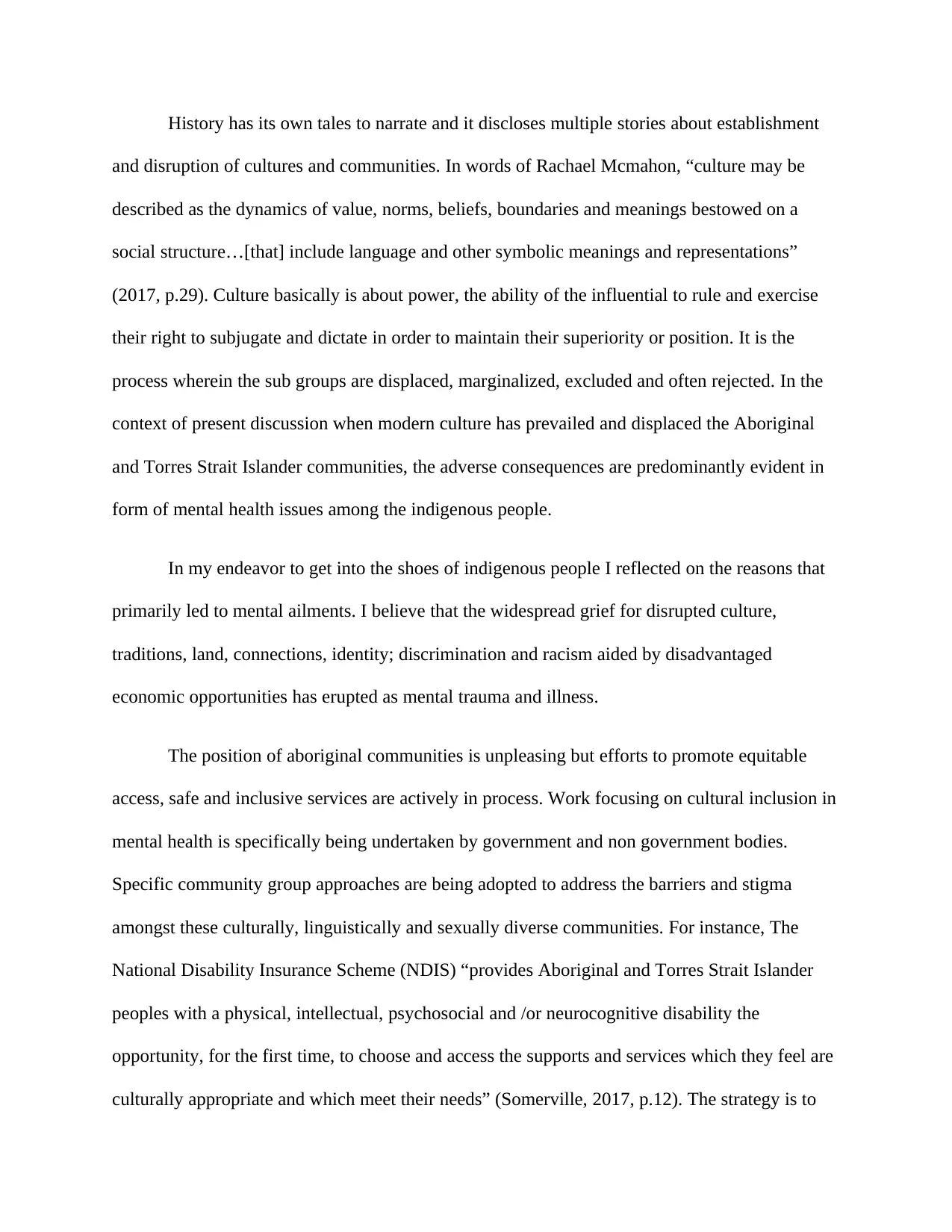
History has its own tales to narrate and it discloses multiple stories about establishment
and disruption of cultures and communities. In words of Rachael Mcmahon, “culture may be
described as the dynamics of value, norms, beliefs, boundaries and meanings bestowed on a
social structure…[that] include language and other symbolic meanings and representations”
(2017, p.29). Culture basically is about power, the ability of the influential to rule and exercise
their right to subjugate and dictate in order to maintain their superiority or position. It is the
process wherein the sub groups are displaced, marginalized, excluded and often rejected. In the
context of present discussion when modern culture has prevailed and displaced the Aboriginal
and Torres Strait Islander communities, the adverse consequences are predominantly evident in
form of mental health issues among the indigenous people.
In my endeavor to get into the shoes of indigenous people I reflected on the reasons that
primarily led to mental ailments. I believe that the widespread grief for disrupted culture,
traditions, land, connections, identity; discrimination and racism aided by disadvantaged
economic opportunities has erupted as mental trauma and illness.
The position of aboriginal communities is unpleasing but efforts to promote equitable
access, safe and inclusive services are actively in process. Work focusing on cultural inclusion in
mental health is specifically being undertaken by government and non government bodies.
Specific community group approaches are being adopted to address the barriers and stigma
amongst these culturally, linguistically and sexually diverse communities. For instance, The
National Disability Insurance Scheme (NDIS) “provides Aboriginal and Torres Strait Islander
peoples with a physical, intellectual, psychosocial and /or neurocognitive disability the
opportunity, for the first time, to choose and access the supports and services which they feel are
culturally appropriate and which meet their needs” (Somerville, 2017, p.12). The strategy is to
and disruption of cultures and communities. In words of Rachael Mcmahon, “culture may be
described as the dynamics of value, norms, beliefs, boundaries and meanings bestowed on a
social structure…[that] include language and other symbolic meanings and representations”
(2017, p.29). Culture basically is about power, the ability of the influential to rule and exercise
their right to subjugate and dictate in order to maintain their superiority or position. It is the
process wherein the sub groups are displaced, marginalized, excluded and often rejected. In the
context of present discussion when modern culture has prevailed and displaced the Aboriginal
and Torres Strait Islander communities, the adverse consequences are predominantly evident in
form of mental health issues among the indigenous people.
In my endeavor to get into the shoes of indigenous people I reflected on the reasons that
primarily led to mental ailments. I believe that the widespread grief for disrupted culture,
traditions, land, connections, identity; discrimination and racism aided by disadvantaged
economic opportunities has erupted as mental trauma and illness.
The position of aboriginal communities is unpleasing but efforts to promote equitable
access, safe and inclusive services are actively in process. Work focusing on cultural inclusion in
mental health is specifically being undertaken by government and non government bodies.
Specific community group approaches are being adopted to address the barriers and stigma
amongst these culturally, linguistically and sexually diverse communities. For instance, The
National Disability Insurance Scheme (NDIS) “provides Aboriginal and Torres Strait Islander
peoples with a physical, intellectual, psychosocial and /or neurocognitive disability the
opportunity, for the first time, to choose and access the supports and services which they feel are
culturally appropriate and which meet their needs” (Somerville, 2017, p.12). The strategy is to
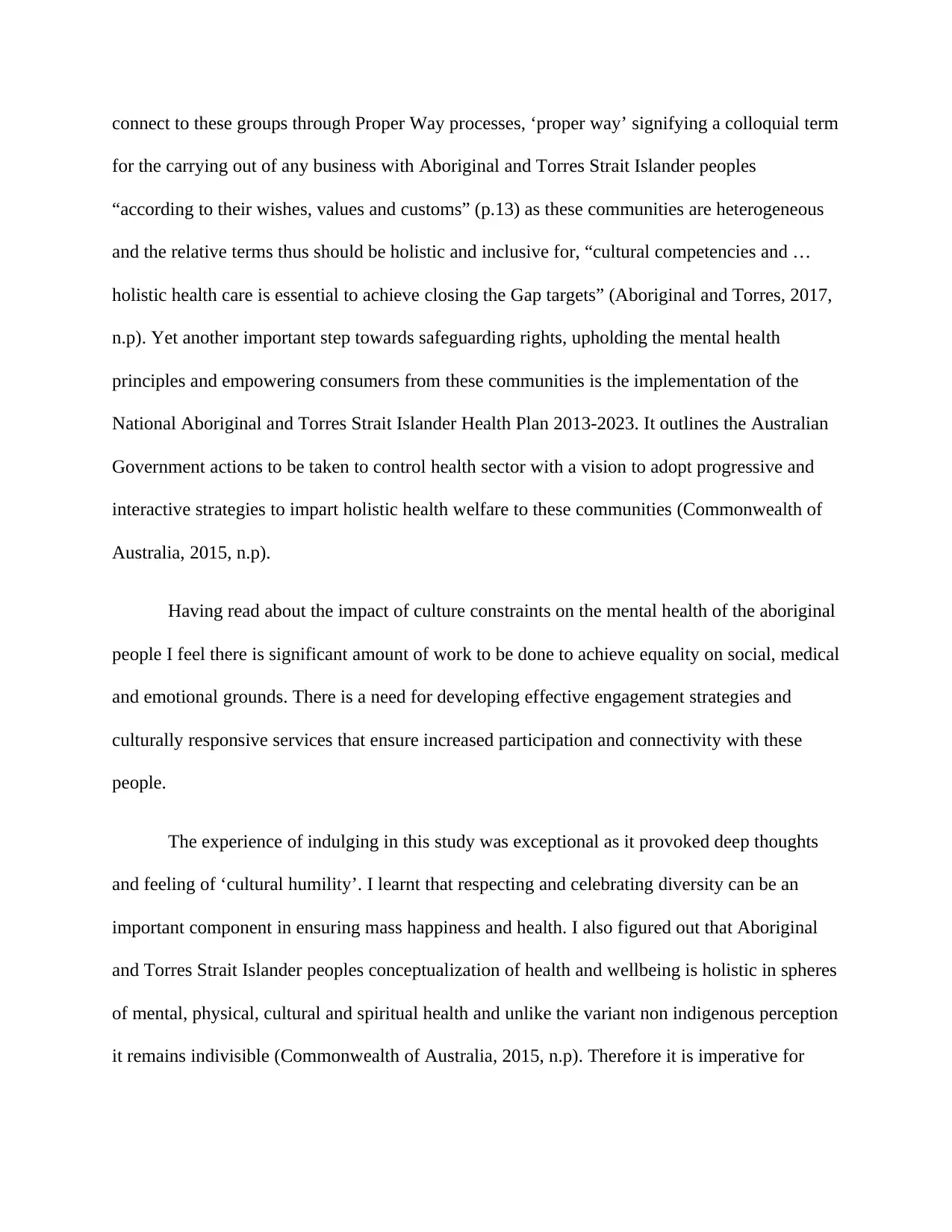
connect to these groups through Proper Way processes, ‘proper way’ signifying a colloquial term
for the carrying out of any business with Aboriginal and Torres Strait Islander peoples
“according to their wishes, values and customs” (p.13) as these communities are heterogeneous
and the relative terms thus should be holistic and inclusive for, “cultural competencies and …
holistic health care is essential to achieve closing the Gap targets” (Aboriginal and Torres, 2017,
n.p). Yet another important step towards safeguarding rights, upholding the mental health
principles and empowering consumers from these communities is the implementation of the
National Aboriginal and Torres Strait Islander Health Plan 2013-2023. It outlines the Australian
Government actions to be taken to control health sector with a vision to adopt progressive and
interactive strategies to impart holistic health welfare to these communities (Commonwealth of
Australia, 2015, n.p).
Having read about the impact of culture constraints on the mental health of the aboriginal
people I feel there is significant amount of work to be done to achieve equality on social, medical
and emotional grounds. There is a need for developing effective engagement strategies and
culturally responsive services that ensure increased participation and connectivity with these
people.
The experience of indulging in this study was exceptional as it provoked deep thoughts
and feeling of ‘cultural humility’. I learnt that respecting and celebrating diversity can be an
important component in ensuring mass happiness and health. I also figured out that Aboriginal
and Torres Strait Islander peoples conceptualization of health and wellbeing is holistic in spheres
of mental, physical, cultural and spiritual health and unlike the variant non indigenous perception
it remains indivisible (Commonwealth of Australia, 2015, n.p). Therefore it is imperative for
for the carrying out of any business with Aboriginal and Torres Strait Islander peoples
“according to their wishes, values and customs” (p.13) as these communities are heterogeneous
and the relative terms thus should be holistic and inclusive for, “cultural competencies and …
holistic health care is essential to achieve closing the Gap targets” (Aboriginal and Torres, 2017,
n.p). Yet another important step towards safeguarding rights, upholding the mental health
principles and empowering consumers from these communities is the implementation of the
National Aboriginal and Torres Strait Islander Health Plan 2013-2023. It outlines the Australian
Government actions to be taken to control health sector with a vision to adopt progressive and
interactive strategies to impart holistic health welfare to these communities (Commonwealth of
Australia, 2015, n.p).
Having read about the impact of culture constraints on the mental health of the aboriginal
people I feel there is significant amount of work to be done to achieve equality on social, medical
and emotional grounds. There is a need for developing effective engagement strategies and
culturally responsive services that ensure increased participation and connectivity with these
people.
The experience of indulging in this study was exceptional as it provoked deep thoughts
and feeling of ‘cultural humility’. I learnt that respecting and celebrating diversity can be an
important component in ensuring mass happiness and health. I also figured out that Aboriginal
and Torres Strait Islander peoples conceptualization of health and wellbeing is holistic in spheres
of mental, physical, cultural and spiritual health and unlike the variant non indigenous perception
it remains indivisible (Commonwealth of Australia, 2015, n.p). Therefore it is imperative for
⊘ This is a preview!⊘
Do you want full access?
Subscribe today to unlock all pages.

Trusted by 1+ million students worldwide
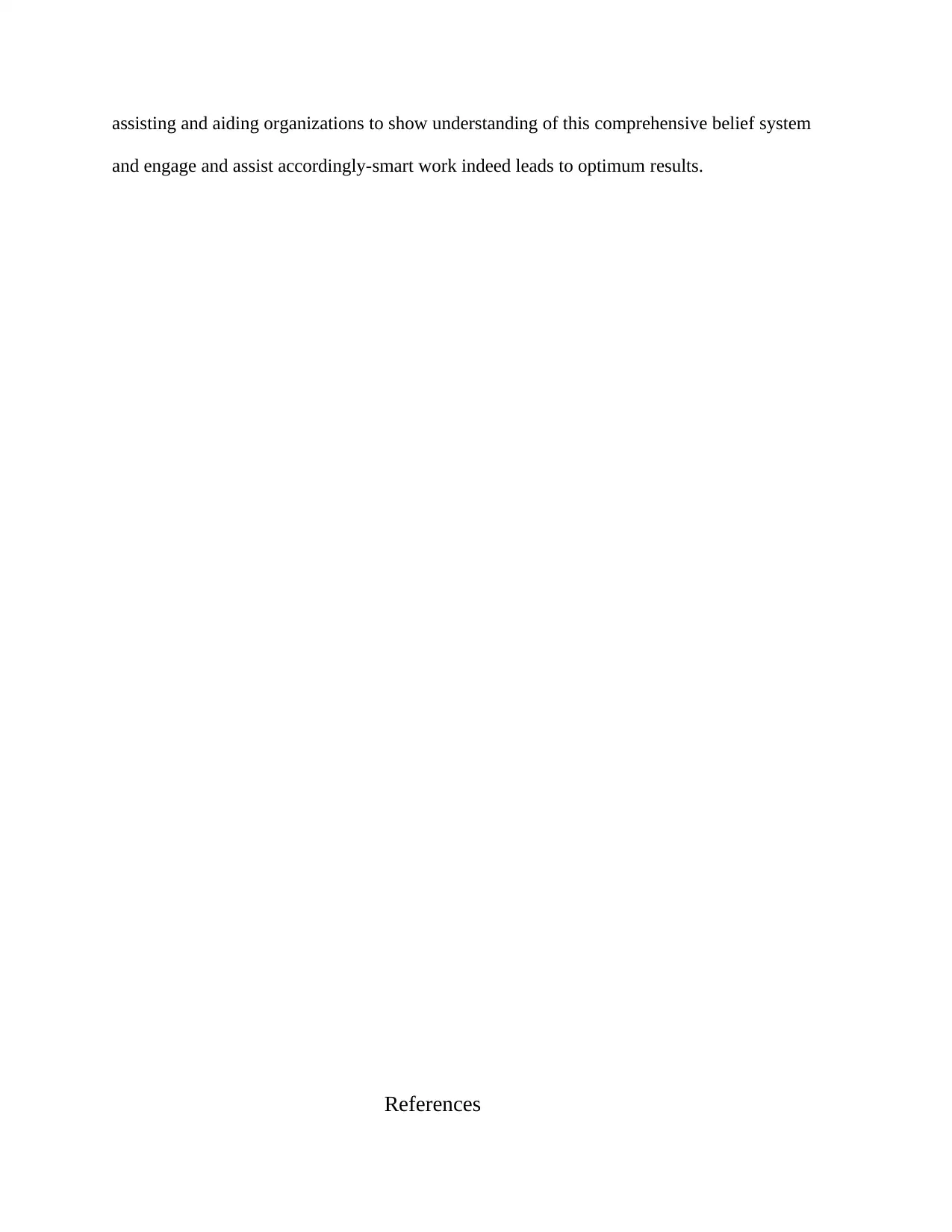
assisting and aiding organizations to show understanding of this comprehensive belief system
and engage and assist accordingly-smart work indeed leads to optimum results.
References
and engage and assist accordingly-smart work indeed leads to optimum results.
References
Paraphrase This Document
Need a fresh take? Get an instant paraphrase of this document with our AI Paraphraser
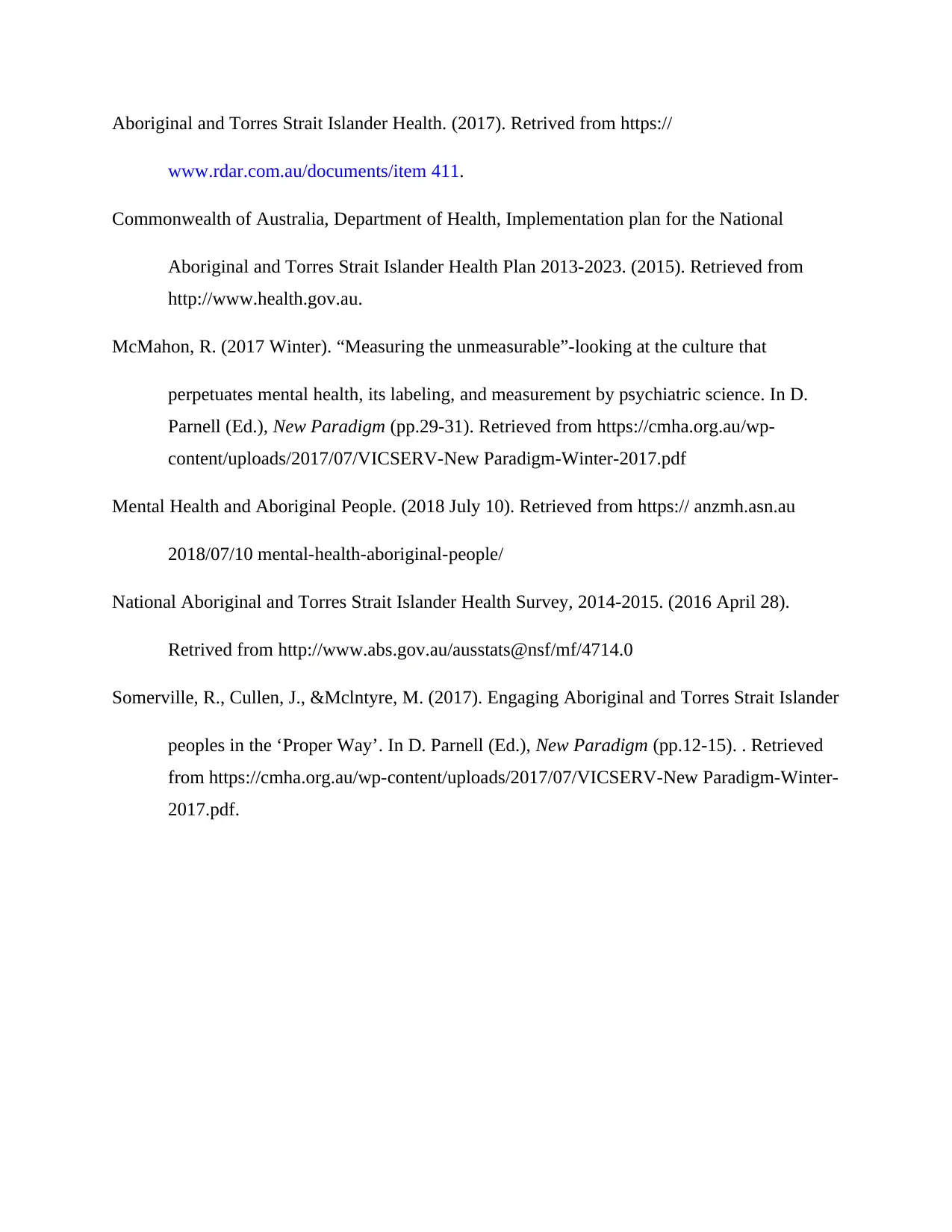
Aboriginal and Torres Strait Islander Health. (2017). Retrived from https://
www.rdar.com.au/documents/item 411.
Commonwealth of Australia, Department of Health, Implementation plan for the National
Aboriginal and Torres Strait Islander Health Plan 2013-2023. (2015). Retrieved from
http://www.health.gov.au.
McMahon, R. (2017 Winter). “Measuring the unmeasurable”-looking at the culture that
perpetuates mental health, its labeling, and measurement by psychiatric science. In D.
Parnell (Ed.), New Paradigm (pp.29-31). Retrieved from https://cmha.org.au/wp-
content/uploads/2017/07/VICSERV-New Paradigm-Winter-2017.pdf
Mental Health and Aboriginal People. (2018 July 10). Retrieved from https:// anzmh.asn.au
2018/07/10 mental-health-aboriginal-people/
National Aboriginal and Torres Strait Islander Health Survey, 2014-2015. (2016 April 28).
Retrived from http://www.abs.gov.au/ausstats@nsf/mf/4714.0
Somerville, R., Cullen, J., &Mclntyre, M. (2017). Engaging Aboriginal and Torres Strait Islander
peoples in the ‘Proper Way’. In D. Parnell (Ed.), New Paradigm (pp.12-15). . Retrieved
from https://cmha.org.au/wp-content/uploads/2017/07/VICSERV-New Paradigm-Winter-
2017.pdf.
www.rdar.com.au/documents/item 411.
Commonwealth of Australia, Department of Health, Implementation plan for the National
Aboriginal and Torres Strait Islander Health Plan 2013-2023. (2015). Retrieved from
http://www.health.gov.au.
McMahon, R. (2017 Winter). “Measuring the unmeasurable”-looking at the culture that
perpetuates mental health, its labeling, and measurement by psychiatric science. In D.
Parnell (Ed.), New Paradigm (pp.29-31). Retrieved from https://cmha.org.au/wp-
content/uploads/2017/07/VICSERV-New Paradigm-Winter-2017.pdf
Mental Health and Aboriginal People. (2018 July 10). Retrieved from https:// anzmh.asn.au
2018/07/10 mental-health-aboriginal-people/
National Aboriginal and Torres Strait Islander Health Survey, 2014-2015. (2016 April 28).
Retrived from http://www.abs.gov.au/ausstats@nsf/mf/4714.0
Somerville, R., Cullen, J., &Mclntyre, M. (2017). Engaging Aboriginal and Torres Strait Islander
peoples in the ‘Proper Way’. In D. Parnell (Ed.), New Paradigm (pp.12-15). . Retrieved
from https://cmha.org.au/wp-content/uploads/2017/07/VICSERV-New Paradigm-Winter-
2017.pdf.
1 out of 5
Related Documents
Your All-in-One AI-Powered Toolkit for Academic Success.
+13062052269
info@desklib.com
Available 24*7 on WhatsApp / Email
![[object Object]](/_next/static/media/star-bottom.7253800d.svg)
Unlock your academic potential
Copyright © 2020–2026 A2Z Services. All Rights Reserved. Developed and managed by ZUCOL.





